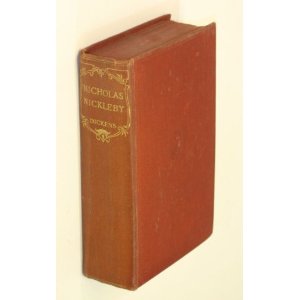Review: ‘Nicholas Nickleby’ by Charles Dickens
 Think of Victorian novels and which one author leaps immediately to mind? For me, and I suspect for many others, it is Charles Dickens. When taking part in a reading challenge which relates to Victorian literature, it seems only right to read something by the great man of Victorian literature himself. However, I have a confession to make (please don’t hurt me): Dickens has never particularly appealed to me. Up until now, my Dickens reading experience has been limited to books I have studied (the sum total of which consists of Oliver Twist, A Christmas Carol and Great Expectations) but this has never stopped me enjoying books in the past so I can hardly blame that for my lack on enthusiasm. Nonetheless, with a handsome sixteen volume 1930′s complete Dickens set which I picked up in a charity shop staring accusingly down at me from the classics shelf I finally decided to just get on with it and pick up a volume. The one that I chose was Nicholas Nickleby.
Think of Victorian novels and which one author leaps immediately to mind? For me, and I suspect for many others, it is Charles Dickens. When taking part in a reading challenge which relates to Victorian literature, it seems only right to read something by the great man of Victorian literature himself. However, I have a confession to make (please don’t hurt me): Dickens has never particularly appealed to me. Up until now, my Dickens reading experience has been limited to books I have studied (the sum total of which consists of Oliver Twist, A Christmas Carol and Great Expectations) but this has never stopped me enjoying books in the past so I can hardly blame that for my lack on enthusiasm. Nonetheless, with a handsome sixteen volume 1930′s complete Dickens set which I picked up in a charity shop staring accusingly down at me from the classics shelf I finally decided to just get on with it and pick up a volume. The one that I chose was Nicholas Nickleby.
The eponymous Nicholas Nickleby travels to London with his mother and sister, Kate, following the death of his father which leaves his family penniless. There he seeks help from their only remaining relative, Ralph Nickleby, who has no desire to assist Nicholas at all, and quickly packs him off to Yorkshire to take a low-paying job as assistant to the wicked school master Wackford Squeers. After witnessing the cruelty that goes on at Dotheboys Hall, Nicholas finds himself unable to stop himself intervening as Squeers punishes a particularly wretched boy known as Smike and is forced to flee back to London following his actions. THere he must once again find work to support his family, while defending his sister from the lecherous advances of Sir Mulberry Hawk and attempting to trace a mysterious lady he has seen.
There is much to be enjoyed in Nicholas Nickleby. The plot is engaging and its episodic structure, a legacy of publication in installments no doubt, causes it to tear along at an impressive pace, surprising considering the size (not to mention the tiny print) of the volume. The tone of the writing is often light and comic and it is populated by a whole host of entertaining caricatures, by turns repulsive and delightful, with equally entertaining names. Who could fail to be intrigued by such intriguing, and indeed revealing, names as Smike, Newman Noggs, Madame Mantalini, Sir Mulberry Hawk, Lord Frederick Verisopht, the brothers Cheeryble and of course, Wackford Squeers?
The problem with Nicholas Nickleby is that, even with my limited experience of Dickens, I was able to guess exactly what would happen to every last character the moment that they were introduced. This of course is not a problem in and of itself: there are plenty of authors whose books I love who are equally predictable. So often in literature it is not where and author goes with a book but the way in which they get there that is of interest, and this is something that I didn’t find wholly satisfying with Nicholas Nickleby. Dickens is by no means a concise writer and is often unnecessarily verbose, particularly when he was grinding the axe of social injustice. I know that he writes social satire and that his novels were intended to bring the plight of the urban poor to the attention of the masses, but as a reader I think they detract from the story with their length and sentimentalism.
I also found that, much as I enjoy Dickens’ well-written and insightful caricatures, I missed the presence of more developed and believable characters in the novel. This was particularly apparent with the young female characters, Kate Nickleby and Madeline Bray. They seem to have no function other than to be good, beautiful and submissive and act as lures for the evil gentlemen and ultimate rewards for their good counterparts. The two are so similar that they are virtually interchangeable, and I wish that they had at least a few distinguishing features and character traits. From the amount of times I’ve heard Little Dorrit referred to as ‘Little Doormat’ it would seem that this might be a problem which extends beyond Nicholas Nickleby into Dickens’ other works. I really hope that isn’t the case.
Nicholas Nickleby by Charles Dickens. Published by Odhams, 1930, pp. 764. Originally published in serial, 1838-1839.